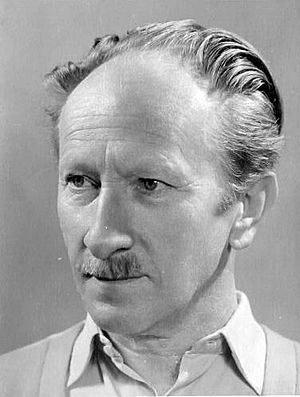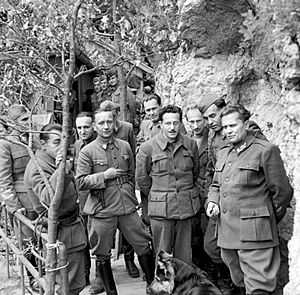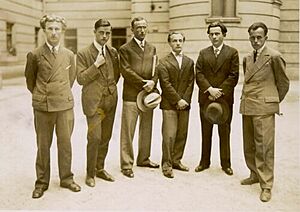Edvard Kocbek facts for kids
Quick facts for kids
Edvard Kocbek
|
|
|---|---|
 |
|
| Born | 27 September 1904 Sveti Jurij ob Ščavnici, Duchy of Styria, Austria-Hungary (now in Slovenia) |
| Died | 3 November 1981 (aged 77) Ljubljana, Slovenia, Yugoslavia |
| Occupation | poet, writer, politician, essayist, translator |
| Spouse | Zdravka Koprivnjak |
| Children | Lučka Kocbek, Matjaž Kocbek, Jurij Kocbek |
Edvard Kocbek (born September 27, 1904 – died November 3, 1981) was a famous Slovenian poet, writer, and essayist. He also worked as a translator. During World War II, he was a member of the Christian Socialists within the Liberation Front of the Slovene Nation and the Slovene Partisans.
Many people think he is one of the best writers in the Slovene language. He is also considered one of Slovenia's top poets after Prešeren. His role in politics during and after World War II made him a very talked-about person in Slovenia in the 20th century.
Contents
Biography
Early Life and School
Edvard Kocbek was born in a village called Sveti Jurij ob Ščavnici. This area was part of the Austro-Hungarian Empire back then. Today, it is in Slovenia.
His father, Valentin Kocbek, was an organist in the local church. An organist plays the organ, a large musical instrument. Edvard was the second of four children in his family.
He first went to a high school in Maribor where classes were taught in German. He later moved to a Slovene-language high school in Ptuj. There, his Slovene teacher, Anton Sovre, noticed Edvard's talent for writing. Sovre encouraged him to write and join a drama club. Edvard also became very interested in the French language and culture.
Youthful Activism
After high school, Edvard went to a special high school in Maribor. He was among the first students to have all their classes in Slovene. During this time, he joined a group of young Christian socialists. They wanted to follow the ideas of earlier Slovene thinkers who believed in social justice and helping others.
This group was inspired by a German thinker named Romano Guardini. They wanted a more personal and heartfelt way of practicing their faith. They believed in fairness for everyone and wanted a new society based on good values. This group became known as the "Crusaders."
In 1925, after finishing high school, Kocbek traveled through Italy. When he returned, he started studying to become a priest but left after two years. He then went to the University of Ljubljana to study French language and literature.
In 1928, he became the main editor of a journal called Križ (Cross). He also published his first poems in a well-known magazine.
Between 1928 and 1929, he spent a year in Berlin. He attended classes and met people from different political groups, including some who followed Marxist ideas.
After finishing his studies, he taught at elementary schools in Croatia. In 1931, he received a scholarship to study in Lyon, France. He also visited Paris, where he met a French thinker named Emmanuel Mounier. Mounier introduced him to a way of thinking called personalism, which focuses on the value of each person. Kocbek kept in touch with this group for the rest of his life.
In 1935, he published his first book of poems, Zemlja (Soil). It was a modern collection that celebrated the quiet beauty of rural life. That same year, he married Zdravka Koprivnjak. In 1936, he returned to Slovenia and became a French teacher.
Anti-Fascist Resistance

In 1937, Kocbek wrote an article called "Reflections on Spain." In it, he criticized some church leaders in Spain who supported the Fascist forces during the Spanish civil war. This article caused a big stir among Slovene Catholics. Kocbek became a leading voice for the Christian left in Slovenia.
In 1938, Kocbek started a new journal called Dejanje (The Action). It quickly became one of the most important journals in Slovenia.
Before World War II, Kocbek had mixed feelings about Communism. He didn't like any kind of totalitarianism (where the government has total control). However, he worked with both Slovene Communists and other liberal thinkers. They tried to form a united group to fight against the growing threat of Fascism.
Soon after the Axis powers invaded Yugoslavia in April 1941, Kocbek helped start the Liberation Front of the Slovene Nation. He was part of its Christian Socialist group.
After hiding for several months, Kocbek joined the Slovene Partisans, who were fighting against the occupation. In 1943, he had to agree that the Communist Party would be the main power within the Partisans.
Near the end of World War II, he was named a minister in the temporary Yugoslav government, led by Josip Broz Tito. After the war, he was given other roles in the new Communist regime, but these roles didn't have much real power.
Removal from Public Life
In 1951, Kocbek published a book of short stories called "Fear and Courage." The stories talked about the difficult choices people faced during the Partisan fight in World War II. The Communist government used this book as an excuse to attack him publicly. They forced him to stop his public work in 1952. He was watched by the government for the rest of his life.
For the next ten years, he was not allowed to appear in public or publish his books. During this time, he made a living by translating books. He translated works by famous authors like Balzac and Antoine de Saint-Exupéry.
During his isolation, Kocbek focused mostly on writing poetry. His poems explored deep ideas about life and ethics in a modern style. After 1964, he was allowed to appear in public more often. Many of his poems were published for the first time since 1952. His later poetry became a big inspiration for younger Slovene writers.
Persecuted Figure
After he was removed from public life in 1952, Kocbek was constantly watched by the Yugoslav Secret Police, called the UDBA. His personal file had over 4,000 pages of reports! Many secret police officials followed him. Some of his close friends were even hired to spy on him.
In 1976, two of his friends were arrested and put on trial for being part of "Kocbek's secret circle." Kocbek himself was never arrested, but the secret police questioned him many times. Some of his personal papers were stolen and never found. His apartment was also bugged. In the mid-1970s, his son Jurij Kocbek found a microphone hidden in a wall during renovations. Kocbek wrote a famous poem about this, called A Microphone in the Wall.
Personal Life
Kocbek was married and had three children. His daughter, Lučka, passed away in 1973 at the age of 34. His older son, Matjaž Kocbek (1946–2013), became a well-known poet. His younger son, Jurij Kocbek (1949–2009), was a photographer.
Besides Slovene, Kocbek spoke German, French, and Serbo-Croatian very well. He also knew Latin and ancient Greek.
Legacy and Commemoration
In the 1980s and especially the 1990s, people started to praise Kocbek's writings much more. His importance as a writer was seen in a new, positive light. In 1998, a street in Ljubljana was named after him. There is also a street named after him in Celje.
In 2004, Slovenia celebrated 100 years since Kocbek's birth with many events. A statue of the poet was placed in Tivoli Park in Ljubljana. It shows him sitting on a bench.
Works
Poetry
- Zemlja ("Earth". Ljubljana: Nova založba, 1934).
- Groza ("Dread". Ljubljana: Slovenska matica, 1963).
- Poročilo: pesmi ("Report: Poems"; Maribor: Založba Obzorja, 1969).
- Žerjavica ("Embers". Trieste: Založništvo tržaškega tiska, 1974).
- Zbrane pesmi ("Collected Poems". Ljubljana: Cankarjeva zalozba, 1977).
Prose
- Strah in pogum: štiri novele ("Fear and Courage: Four Short Stories". Ljubljana: Državna založba Slovenije, 1951).
Essays and Diaries
- Tovarišija: dnevniški zapiski od 17. maja 1942 do 1. maja 1943 ("The Comradeship: Diary Entries from 17th May 1942 to 1st May 1943". Ljubljana: Državna založba Slovenije, 1949).
- Slovensko poslanstvo : dnevnik s poti v Jajce 1943 ("The Slovene Mission: Diary from the Journey to Jajce, 1943". Celje: Mohorjeva družba, 1964).
- Listina : dnevniški zapiski od 3. maja do 2. decembra 1943 ("The Document: Diary Entries from 3rd May to 2nd December 1943." Ljubljana: Slovenska matica, 1967).
- Svoboda in nujnost: pričevanja ("Freedom and Necessity: Testimonies". Celje: Mohorjeva družba, 1974), with a preface by France Vodnik.
- Krogi navznoter ("Inside Circles". Ljubljana: Slovenska matica, 1977).
- Pred viharjem ("Before the Storm". Ljubljana: Slovenska matica, 1980), with a preface by Janez Gradišnik.
- Sodobni misleci ("Contemporary Thinkers". Ljubljana: Slovenska matica, 1981), with a preface by Janez Gradišnik.
Translations to English
- The Lipizzaners (poetry) (Ljubljana: Association of Slovene Writers, 1989).
- Na vratih zvečer = At the Door at Evening (poetry) (Dorion, Quebec & Ljubljana: The Muses' Co., Aleph, 1990).
- Embers in the house of night : selected poems of Edvard Kocbek (Santa Fe, New Mexico: Lumen, 1999).
- Nothing Is Lost: Selected Poems (Princeton, Oxford: Princeton University Press, 2004).
See also
 In Spanish: Edvard Kocbek para niños
In Spanish: Edvard Kocbek para niños
- Slovenian literature
- History of Slovenia
 | Dorothy Vaughan |
 | Charles Henry Turner |
 | Hildrus Poindexter |
 | Henry Cecil McBay |


